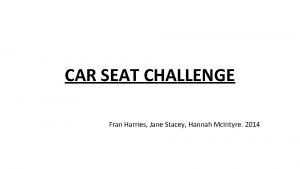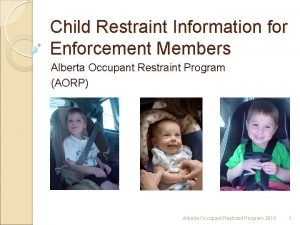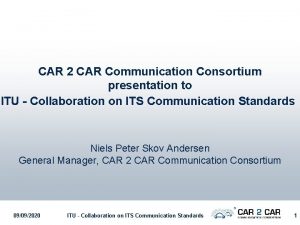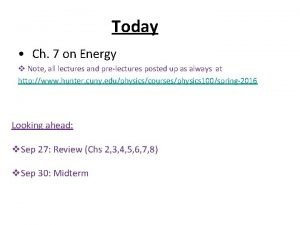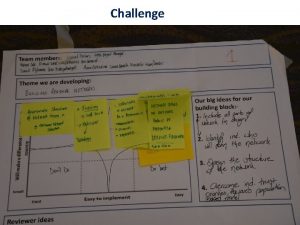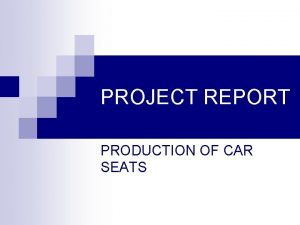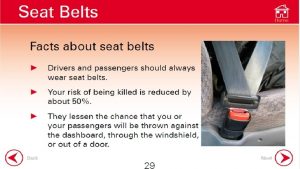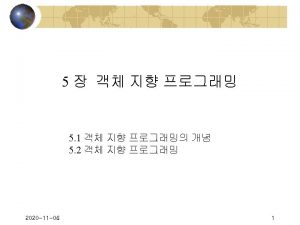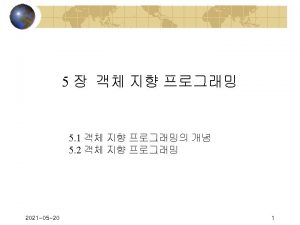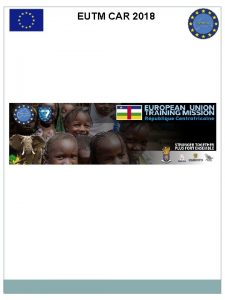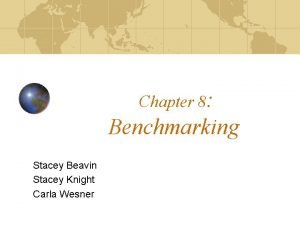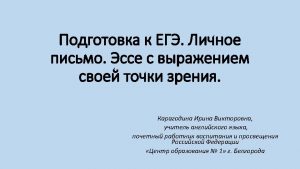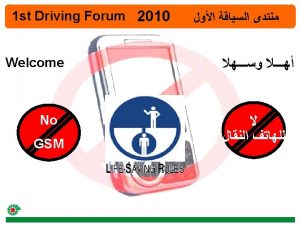CAR SEAT CHALLENGE Fran Harries Jane Stacey Hannah












- Slides: 12

CAR SEAT CHALLENGE Fran Harries, Jane Stacey, Hannah Mc. Intyre. 2014

• Since the 1980’s studies have shown that premature infants are at an increased risk of apnoea and desaturations when placed in semi-upright car safety seats. • Due to these findings, the American Academy of paediatrics (AAP) began recommending that infants born prematurely be observed in their car seats to monitor for episodes of desatuartion, bradycardia or apnoea prior to discharge. • This is known as the infant car seat challenge (ICSC). • The most recent AAP recommendations from 2009 state that all infants born at less than 37 weeks gestation should undergo an ICSC for 90 – 120 mins or the duration of their car ride home whichever is the longer.

• The All Wales Neonatal Outreach Group discussed the benefit of parental guidelines on the safe use of a car seat for discharge of premature infants. A review of current practice within the UK was undertaken by Fran Harries as Chair of the Group, Jane Stacey A. N. P and Hannah Mc. Intyre, Trainee A. N. P in August 2014.

Why do a Car seat challenge? • Increase in lower discharge weight and gestational age with outreach support. • Infants prone to respiratory compromise when carried in seats that are intended for larger babies. • Apnoea • Bradycardia • Desaturations

What’s happening in the UK • Bhojani et al, Car Seat Challenge – the current practice. Infant 2008; 4(6): 211 -13. • 30 units were contacted • 9 performed car seat challenge • 1/9 hospitals had a written protocol • 7/9 performed test on only on infants having home oxygen • 1/9 performed test only on CLD/Cleft palate patients

2014 ABHB contacted 100 neonatal units in UK. • Methods • A telephone survey was undertaken of 100 neonatal units in the UK to identify if they complete any ICSC prior to discharge home, their policy and their criteria. • • The 100 units contacted included NICUs (43%), LNUs (45%) and SCBUs (12%). • The units were chosen at random from a BAPM directory rather than based on their current level. • Of the 100 units contacted 49% currently undertake an ICSC. • This 49% further identifies CSC Level 1 (41. 66%), Level 2 (44. 44%) and Level 3 (55. 81%).


Why do infants fail a car seat challenge? Slouching – leads to neck flexion – impingement of tongue on posterior pharyngeal wall Prominent occiput – neck flexion Weak neck muscles Posterior displacement of mandible

What to do if they fail? In UK & USA there is variation in managements of infants who “fail”. Delaying hospital discharge Days? Week? Bigger stronger more mature Modifying the seat Blanket inserts H shape car seat insert Prevents forward flexion Cost implication/availability

Potential options if they fail? Travel supine Flat / 30 degrees compared to 45 degrees Less than optimal in collision Respiratory stimulant Poor evidence

The potential impact of car seat challenge Costs Nursing time Delayed hospital discharge Impact on ITU availability

Conclusion: • The ICSC has been introduced on the supposition that the test will identify babies who are at risk of preventable adverse events while in a car safety seat. • There are no national guidelines around the methodology of the ICSC. • This review recognises the lack of any standard practice amongst units to complete a CSC on their babies prior to discharge. • Consideration for an All Wales standard of practice.
